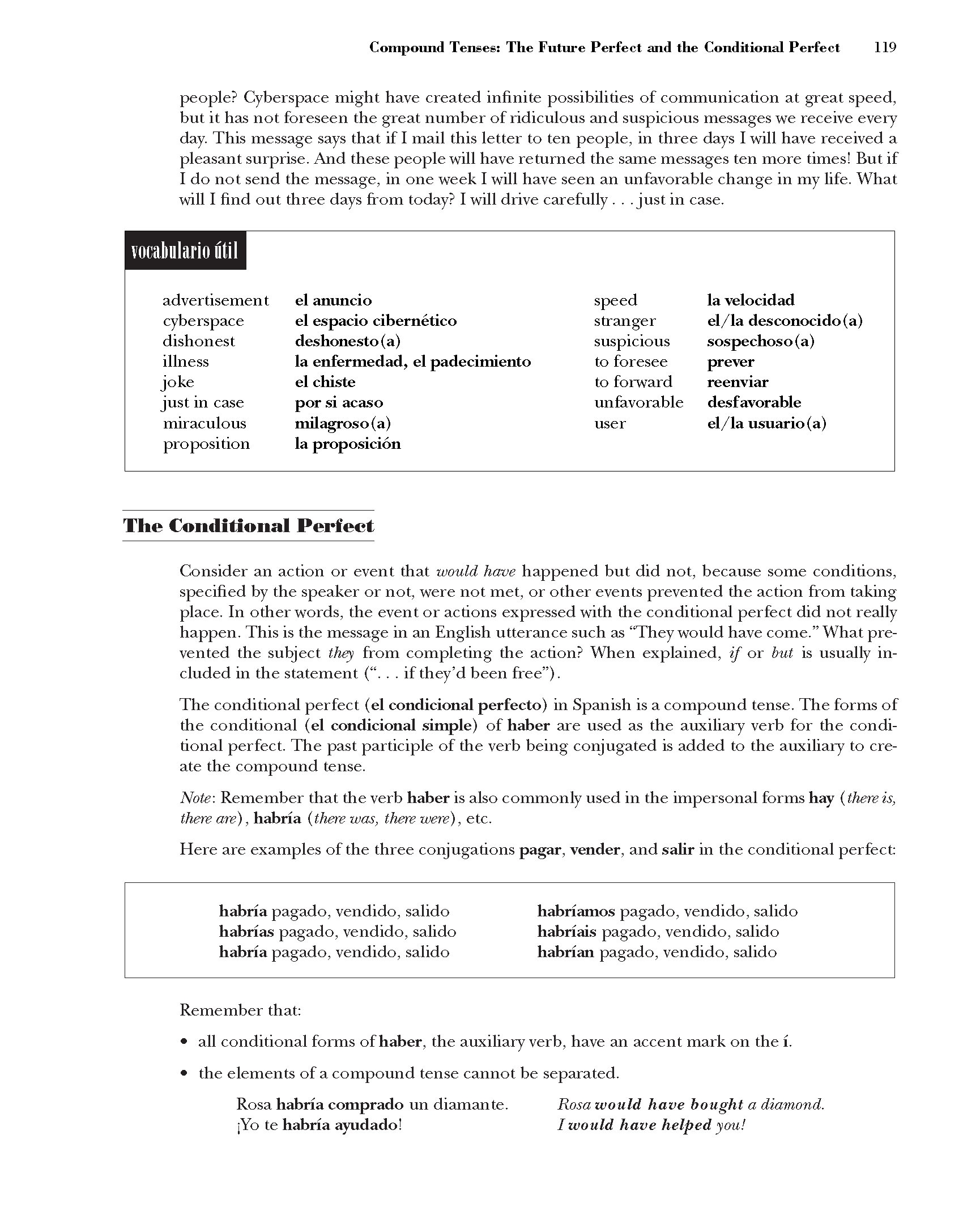CSG130

119
Compound Tenses: The Futurę Perfect and the Conditional Perfect
people? Cyberspace might have created infinite possibilities of communication at great speed, but it has not foreseen the great number of ridiculous and suspicious messages we receive every day. This message says that if I mail this letter to ten people, in three days I will have received a pleasant surprise. And these people will have returned the same messages ten morę times! But if I do not send the message, in one week I will have seen an unfavorable change in my life. What will I find out three days from today? I will drive carefully . . . just in case.
advertisement
cyberspace
dishonest
illness
joke
just in case miraculous proposition
el anuncio
el espacio cibernetico deshonesto(a)
la enfermedad, el padecimiento
el cliiste
por si acaso
milagroso(a)
la proposición
speed
stranger
suspicious
to foresee
to forward
unfavorable
user
The Conditional Perfect
Consider an action or event that would have happened but did not, because some conditions, specified by the speaker or not, were not met, or other events prevented the action from taking place. In other words, the eventor actions expressed with the conditional perfect did not really happen. This is the message in an English utterance such as “They would have come.” What pre-vented the subject they from completing the action? When explained, if or but is usually in-cluded in the statement (“. . . if they’d been free”).
The conditional perfect (el condicional perfecto) in Spanish is a compound tense. The forms of the conditional (el condicional simple) of haber are used as the auxiliary verb for the conditional perfect. The past participle of the verb being conjugated is added to the auxiliary to cre-ate the compound tense.
Notę: Remember that the verb haber is also commonly used in the impersonal forms hay (there is, there are), habria (there was, there were), etc.
Here are examples of the three conjugations pagar, vender, and salir in the conditional perfect:
|
habria pagado, vendido, salido |
habriamos pagado, vendido, salido |
|
habrias pagado, vendido, salido |
habriais pagado, vendido, salido |
|
habria pagado, vendido, salido |
habrian pagado, vendido, salido |
Remember that:
• all conditional forms of haber, the auxiliary verb, have an accent mark on the i.
• the elements of a compound tense cannot be separated.
Rosa habria comprado un diamante. Rosa would have hought a diamond.
jYo te habria ayudado! I would have helped you!
Wyszukiwarka
Podobne podstrony:
CSG132 121 Compound Tenses: The Futurę Perfect and the Conditional Perfect 6. Habr
CSG134 123 Compound Tenses: The Futurę Perfect and the Conditional PerfectOne Morę Use of the Condit
CSG128 Compound Tenses: The Futurę Perfect and the Conditional Perfect 117 11-3 ejercicio La duda. E
CSG132 121 Compound Tenses: The Futurę Perfect and the Conditional Perfect 6. Habr
CSG132 121 Compound Tenses: The Futurę Perfect and the Conditional Perfect 6. Habr
CSG134 123 Compound Tenses: The Futurę Perfect and the Conditional PerfectOne Morę Use of the Condit
CSG134 123 Compound Tenses: The Futurę Perfect and the Conditional PerfectOne Morę Use of the Condit
CSG120 Compound Tenses: The Present Perfect and the Past Perfect 109Wlieii Is the Present Perfect Te
CSG116 Compound Tenses: The Present Perfect and the Past Perfect 105 yo he nosotros/n oso
CSG118 107 Compound Tenses: The Present Perfect and the Past Perfect • Irregular past participles in
więcej podobnych podstron